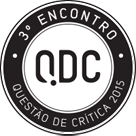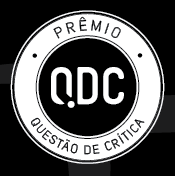Críticas
Notas sobre a atualidade da “estética da fome”
Vol. VII, nº 62, junho de 2014
Resumo: O ensaio procura analisar a recente montagem teatral de Deus e o Diabo na terra do sol, baseada no filme de Glauber Rocha lançado em 1964, à luz dos princípios da “estética da fome”, apresentados pelo cineasta em texto homônimo de 1965. O ensaio defende que a “estética da fome” preserva uma inegável atualidade, continuando relevante para se pensar alternativas ao modelo contemporâneo de produção teatral no Brasil.
Palavras-chave: Glauber Rocha, estética da fome.
Abstract: The essay analyses the recent theatrical representation of Deus e o Diabo na terra do sol, based upon Glauber Rocha´s classical film, first presented in 1964, and discusses some of the principles developed by Glauber Rocha in an essay called “The aesthetics og hunger”, published in 1965. The essay sustains that the “aesthetics of hunger” preserves an undeniable actuality, being still relevant to think alternatives to the contemporary theatrical production system in Brasil.
Key-words: Glauber Rocha, aesthetics of hunger
Os fofos encenam o popular
Vol. VII, nº 62, junho de 2014
RESUMO: O texto pretende estabelecer pontos de aproximação e de afastamento que o espetáculo Assombrações do Recife Velho estabelece com a noção tradicional de cultural popular. Esta noção, por sua vez, possui ela mesma dificuldades de definição, e a peça da companhia Os Fofos Encenam se insere precisamente como ponto de articulação dessas questões.
Palavras-chave: Os Fofos Encenam; Gilberto Freyre; Cultura popular.
ABSTRACT: The essay’s intention is to establish elements on the play Assombrações do Recife Velho in which we will find moments of convergence and divergence from the traditional notion of popular culture. In its turn, this notion presents itself difficulties concerning its own definition. The play by the Brazilian theatre company Os Fofos Encenam shows us an interesting articulation of these questions.
Key-words: Os Fofos Encenam; Gilberto Freyre; popular culture.
Vias abertas por fluxos destrutivos
Vol. VII, nº 62, junho de 2014
Resumo: Este texto trata do espetáculo Pindorama da Lia Rodrigues Companhia de Danças encenado num galpão localizado no Complexo de Favelas da Maré. A visada sobre o espetáculo aborda seus aspectos imanentes em relação com um caráter destrutivo que se aproximaria da noção de Walter Benjamin em texto homônimo.
Palavras-chave: Lia Rodrigues, Walter Benjamin, dança contemporânea
Abstract: This text talks about the presentation Pindorama by Lia Rodrigues Dance Company performed in a warehouse located in the Favela da Maré Complex. The perspective here presented approaches the presentation’s immanent aspects in relation to Walter Benjamin’s notion of the destructive character.
Keywords: Lia Rodrigues, Walter Benjamin, Contemporary dance.
Como Adler & Gibb
Vol. VII, nº 62, junho de 2014
Resumo: O texto analisa o novo espetáculo teatral do criador britânico Tim Crouch: Adler & Gibb, que cumpre temporada em junho e julho no Royal Court Theatre, em Londres. Propõe-se uma reflexão a respeito de um fato duplo: o fascínio pela arte conceitual que é o ponto de partida para a trama e a denominação “desmaterializado” que Crouch utiliza para descrever o seu fazer teatral.
Palavras-chave: arte conceitual, teatro contemporâneo britânico, Tim Crouch
Abstract: The article analyzes the new play of the British creator Tim Crouch: Adler & Gibb, premiered at the Royal Court Theatre on June 2014. The reflection is based on a double fact: the fascination with conceptual art that is the starting point for the plot and the “dematerialized” label that Crouch uses to describe his theater.
Keywords: conceptual art, contemporary British theater, Tim Crouch
Para além da montagem de formatura
Vol. VII, nº 62, junho de 2014
Resumo: Análise crítica do espetáculo teatral Yerma, de Federico Garcia Lorca e direção de Renato Carrera com os alunos formandos do primeiro semestre de 2014 da Casa de Artes de Laranjeiras (CAL). O artigo procura analisar a montagem com o olhar sobre sua qualidade técnica empenhada pela força conjunta e o diálogo estabelecido entre direção e alunos formandos.
Palavras-chave: formação artística, grotesco, ritualização
Abstract: Critical analysis of the staging of Yerma, by Federico Garcia Lorca, directed by Renato Carrera with senior students graduating on the first semester of 2014 from CAL (Casa das Artes de Laranjeiras). The article intents to analyze the staging by taking a close look at its technical qualities, which are a result of a joint force and of a conversation between the work of the director and the senior students.
Key-words: artistic training, grotesque, ritualization




